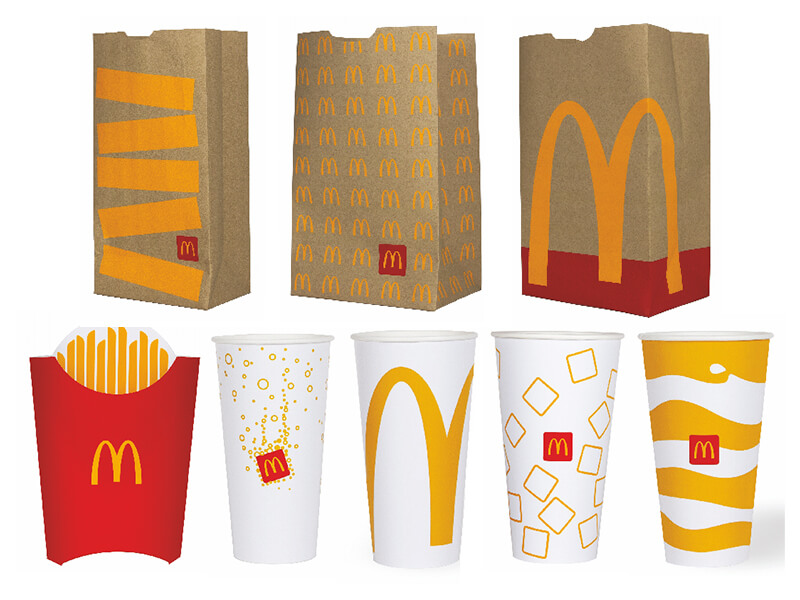Our innovative and sustainable fiber packaging solutions include paper straws, easy-open & tamper-evident stickers for carry-out bags, and tamper-evident labels for cups in delivery.

Popular food chain McDonald’s recently announced that the company has almost achieved its goal of sourcing all of its paper food packaging in restaurants from recycled or sustainable fiber in its Purpose and Impact Progress Report-2020-2021. The company claims that 80 percent of its packaging came from renewable, recycled or certified sources in 2020, and 25 percent of its restaurants in the company’s 30 largest markets offer customers the opportunity to recycle packaging materials. Further, the US-based quick service restaurant (QSR) chain has set goals to source 100 percent of its guest packaging from renewable, recycled or certified sources. Paper Mart got the opportunity to interact with Mr. Rajeev Ranjan, COO, Connaught Plaza Restaurants Pvt. Ltd. and know more about the packaging strategies of McDonald’s.
Paper Mart: McDonald’s is sourcing 99.6 percent of its paper food packaging from recycled or sustainable fiber. Please outline the efforts made by the company with respect to incorporating innovative packaging solutions.
Rajeev Ranjan: All centrally sourced packaging in McDonald’s North and East India is Chain of Custody (CoC) certified, with 100 percent of wood fiber coming from recycled sources or forests certified to the Forest Stewardship Council (FSC) standard, a globally recognised standard for responsible forest management.
Essentially, the Forest Stewardship Council (FSC) sets standards for and promotes environmentally responsible, socially beneficial and economically viable management of the world’s forests. Wood and paper products labelled as FSC certified are high standards products and the flow of the material can be monitored from the forest to the end product. This is known as the Chain of Custody.
FSC certified fiber has been our primary material replacement for plastic packaging in the Indian market. Driven by our efforts to reduce conventional single-use plastics, supported by legislative pressure in certain areas, we have decided to transition away from plastic bags, plastic straws, plastic cutlery, and plastic cups.
We continue to work with our partners and suppliers in developing new innovative materials and technologies such as moulded fiber. Our innovative and sustainable fiber packaging solutions include paper straws, easy-open & tamper-evident stickers for carry-out bags, and tamper-evident labels for cups in delivery. Additionally, for our lids, we are currently using bio-based plastic material (PLA) which can be industrially composted.
Over the last 4-5 years, our efforts on introducing sustainable solutions in guest packaging have resulted in an overall annual reduction of 15 metric tons of plastic annually.
PM: How does your company view paper packaging as a resource-efficient product with the lowest environmental impact?
RR: Paper packaging accounts for more than 80 percent of all packaging, including over 50 items of paper bags, paper cups, paper straws, and paper boxes. Our packaging strategy is based on maximising the use of Chain of Custody certified fiber for our paper packaging products. These Chain of Custody certified products help us reduce our environmental footprint and reflect our preference for fiber over plastic packaging. We have also initiated work to validate 100 percent recycled fiber-based carton board for packaging as a step towards a circular economy and improved recycling.
Over the last 4-5 years, our efforts on introducing sustainable solutions in guest packaging have resulted in an overall annual reduction of 15 metric tons of plastic annually. Transitioning to FSC certified materials has resulted in approximately a 16 percent reduction in plastic use against a 2017 baseline.
Watch: Paper Mart News Roundup
PM: Could you please share an overview of paper-based material used for the packaging of your products?
RR: McDonald’s packaging suppliers use a wide range of fiber, carton board and paper in the production of our food service packaging. All these materials are manufactured while ensuring that they are fully compliant with local and regional food contact specifications.
PM: What factors should be considered while choosing paper packaging material for food products?
RR: McDonald’s food packaging is designed to protect our food products and maintain heat whilst reducing moisture, ensuring that paper packaging is 100 percent food safe and providing the necessary barrier or resistance to grease and oils.
Along with the certification of the materials used in the production of the paper packaging, the qualification and certification of the manufacturers and the materials used in the construction of the final printed packaging are critical. Food safety is the number one priority. Alongside this requirement, designing packaging for end-of-life is also important. Utilising the appropriate printing inks and glues to enable fiber recovery needs to be embedded in the final specification.
McDonald’s also prioritises recycled materials over virgin, subject to direct food contact testing and approval, and our minimum fiber sourcing requirements are FSC certification, in alignment with our commitment to eliminate deforestation across our supply chains.

Our innovative approach to packaging design means we have been able to roll out a wide range of new paper-based products in India and we plan to introduce many more in the next few years.
Also Read: McDonald’s Almost Entire Paper Packaging from Sustainable Fiber
PM: As a socially and environmentally responsible food chain – what could be the ideal roadmap to further boost the growth of sustainable and paper-based packaging?
RR: McDonald’s continues to increase the number of sustainable fibers packaging products, replacing problematic plastics wherever possible. Our innovative approach to packaging design means we have been able to roll out a wide range of new paper-based products in India and we plan to introduce many more in the next few years. This includes more renewable fiber coatings – that are easy for recycling, reduce plastic content and help meet the end-of-life requirements as per local legislation. We are also introducing innovative technologies such as moulded fiber to replace current bio-polymer lids, heat seal lids, and moving from clamshells to wraps to reduce packaging waste.
PM: McDonald’s has set a larger goal for its entire customer packaging to come from renewable, recycled, or certified sources by 2025. What kind of trends do you foresee for food packaging?
RR: Globally, McDonald’s expects to increase the use of Chain of Custody certified fiber across the complete packaging portfolio and implement global and local solutions across the business to expand the reduction, reuse and recycling of guest packaging.



